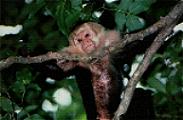|
AFASST Course
to La Suerte Biological Field Station, Costa Rica to study ecology and behaviour of free-ranging primates

EARTHQUEST (Canada) now has an opportunity to journey to Costa Rica and learn how to study free-ranging primate species. We will only be offering One Expedition/AFASST equivalent course to Costa Rica in 2005. Our mission will be to travel to the La Suerte Biological Field Station located in Costa Rica and study the ecology and behaviour of free-ranging primate species that live there. This course is designed to be a field course which explores the interfaces between primate behavior and biology. The field site will serve as a living laboratory where students experience New World monkeys, their biology and behavior, in their native habitats. The course is comprised of daily lectures and daily field exercises on aspects of primate ecology, biology, behavior, and the rainforest environment. Howler monkeys and possibly capuchins will be observed on a daily basis in forest environments surrounding the field station. All students will develop research proposals which will be done on site during the latter half of the course.
Lecture topics in the course will include:
Introduction to primate behavior and biology.
What is a primate? A discussion of primate evolution and classification. What characteristics or traits sort out primates into groups? What distinguishes New World primates?
What do primates look like-inside and out? An overview of primate morphology including the skeleton, teeth, body size, adaptations of other morphological systems.
Life history of primates: How long does it take a primate to grow up? How does appearance and behavior change with age?
Primate adaptions in the forest: What are the resources and how do primates respond?
A close look at the mantled howler monkey (Alouatta) and capuchin (Cebus): life history and behavior including ecology, resource exploitation, locomotor and positional adaptions, social behavior, reproduction, etc.
Neotropical forest conservation: What is the future for primates in the rainforest: What can be done to promote their survival?
Project team members will help track primates through the jungle and learn about them through direct observation. Please be advised that you must take the EARTHQUEST FASST Course for primate studies, first before you can qualify for this program. This course costs $699.00 US to take. Upon succesful completion of this course then you will be enrolled in the primate course in Costa Rica as your AFASST Course. All successful graduates of these courses will be eligible to apply to EARTHQUEST for internship and employment opportunities in primate field biology.
You can live the life of a Tropical Field Biologist/Primatologist
and study one of two monkey species below
| Explore trails | 
| Habitat mapping procedures |   |
Observational sampling techniques on primates |
| Red-eyed Frog |  |
| Concepcion Volcano, Ometepe Island | 
| Scientific Report Writing |  |
Study primate social organization and behaviour |
White-faced Capuchin
monkey (Photo: Chad Day) |  |
  |
Dates: Summer session #1: May 25 - June 19, 2009; Summer session #2: July 20 - August 14, 2009
Cost: $2449.00 USD
Winter session: Dec. 27, 2008 - January 18, 2009
Cost: $2199.00 USD
(Please note: Due to the nature of the program, all prices and program contents are subject to change without prior notice or approval).
Included in 26 day Course Costs:
 ..........Services of project staff ..........Services of project staff
 ..........Certificate of completion ..........Certificate of completion
 ..........room and board (3 meals per day) at La Suerte biological field station ..........room and board (3 meals per day) at La Suerte biological field station
 ..........instruction ..........instruction
 ..........SCHEDULED transportation from near the airport in San Jose, Costa Rica to La Suerte round trip ..........SCHEDULED transportation from near the airport in San Jose, Costa Rica to La Suerte round trip
 ..........Course tuition ..........Course tuition
 ..........FASST Course tuition ..........FASST Course tuition
Not Included in 26 day Course Costs:
 ..........Airport taxes and government departure taxes ..........Airport taxes and government departure taxes
 ..........Health or cancellation insurance ..........Health or cancellation insurance
 ..........Beverages/liquor ..........Beverages/liquor
 ..........Additional funds for souvenirs, extra food, etc. ..........Additional funds for souvenirs, extra food, etc.
 ..........Valid passport ..........Valid passport
 ..........Immunizations/vaccinations ..........Immunizations/vaccinations
 ..........Personal supplies (e.g. hiking boots, tents, clothing, etc.) ..........Personal supplies (e.g. hiking boots, tents, clothing, etc.)
 ..........Round trip airfare to San Jose, Costa Rica ..........Round trip airfare to San Jose, Costa Rica
 ..........Academic credit ..........Academic credit
To Register for the Course:
For 26 day course a non-refundable deposit of $699.00 US/person + $80.00 CAD registration fee is required to secure space. Full payment is due 60 days prior to departure (postmarked by mail does not count). We recommend that you book early as spaces on teams fill quickly and are limited to 22 participants. Spaces are filled on a first-come, first-serve basis and fill quickly so we recommend that you apply ASAP. All tuition costs are NON-REFUNDABLE, but may be transferred to another year. Academic credit is available - please inquire for details.
For information on terms and conditions please click here.
For applications please click here. |
 
 E-mail: earthquestcanada@yahoo.com E-mail: earthquestcanada@yahoo.com
Executive Director & Senior Instructor
D. Jolly, B.Sc.
EARTHQUEST (Canada) for the Environment
8122 Rogers Rd. S., RR #5
Aylmer, Ontario, Canada
N5H 2R4
Tel: 519-875-3340
ęcopyright EARTHQUEST (Canada) for the Environment
| Website designed and maintained by D. Jolly
Last Updated 27/11/08 | |
|








